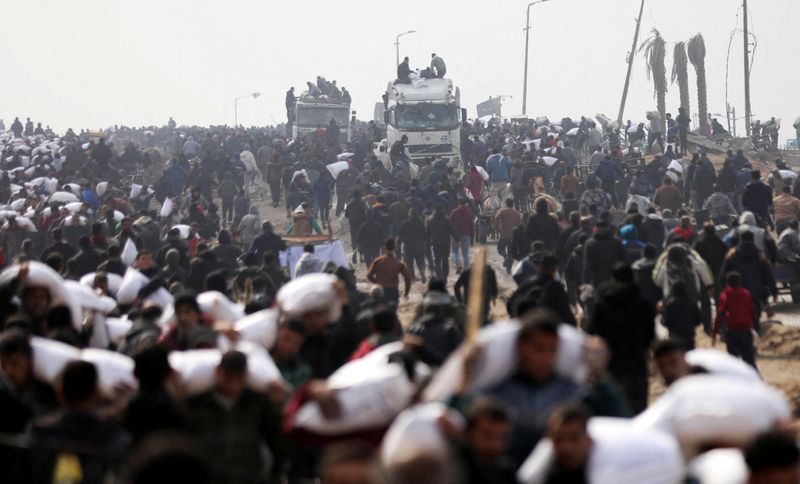By Gabrielle Tétrault-Farber
GENEVA (Reuters) -Israel's restrictions on humanitarian aid for Gaza may amount to a starvation tactic that could be a war crime, the United Nations human rights chief said on Tuesday.
The stark appraisal followed a U.N.-backed report on Monday saying famine is likely by May without an end to fighting in the more than five-month war between Israel and Hamas militants in the Palestinian enclave of 2.3 million people.
"The extent of Israel's continued restrictions on entry of aid into Gaza, together with the manner in which it continues to conduct hostilities, may amount to the use of starvation as a method of war, which is a war crime," said the U.N. High Commissioner for Human Rights, Volker Turk.
While aid agencies blame Israel for blockading Gaza, Prime Minister Benjamin Netanyahu's government says it is facilitating aid and the United Nations and relief groups are at fault for any issues over the quantity and pace of delivery.
In response to Turk's statement, the Israeli diplomatic mission in Geneva said: "Israel is doing everything it can to flood Gaza with aid, including by land air and sea. The U.N. must also step up."
As the occupying power in Gaza, Israel is obligated to ensure the provision of food and medical care to the population and to facilitate the work of humanitarian organisations trying to deliver aid, Turk said in his statement.
Monday's report by the Integrated Food Security Phase Classification (IPC) said malnutrition and food insecurity have probably exceeded famine levels in Gaza's north, and hunger-linked death rates were likely to reach famine levels soon.
"The coping mechanisms we have seen the past weeks, even months, are people eating bird seeds, animal fodder, wild grass, and weeds," said Jens Laerke, spokesperson for the U.N. humanitarian office (OCHA).
"They have consumed that already. We are beyond that. There's literally nothing left."

Turk said the crisis was "human-made" and urged all states to put pressure on Israel to facilitate the delivery of aid into Gaza.
"There needs to be full restoration of essential services, including the supply of food, water, electricity and fuel," Turk said.